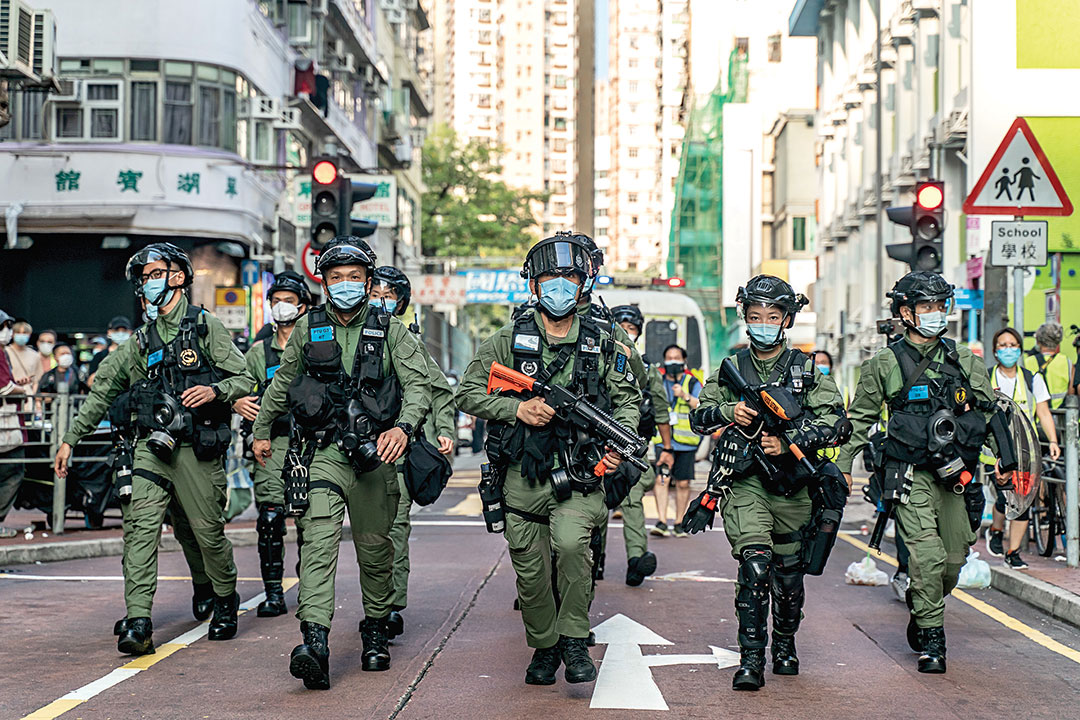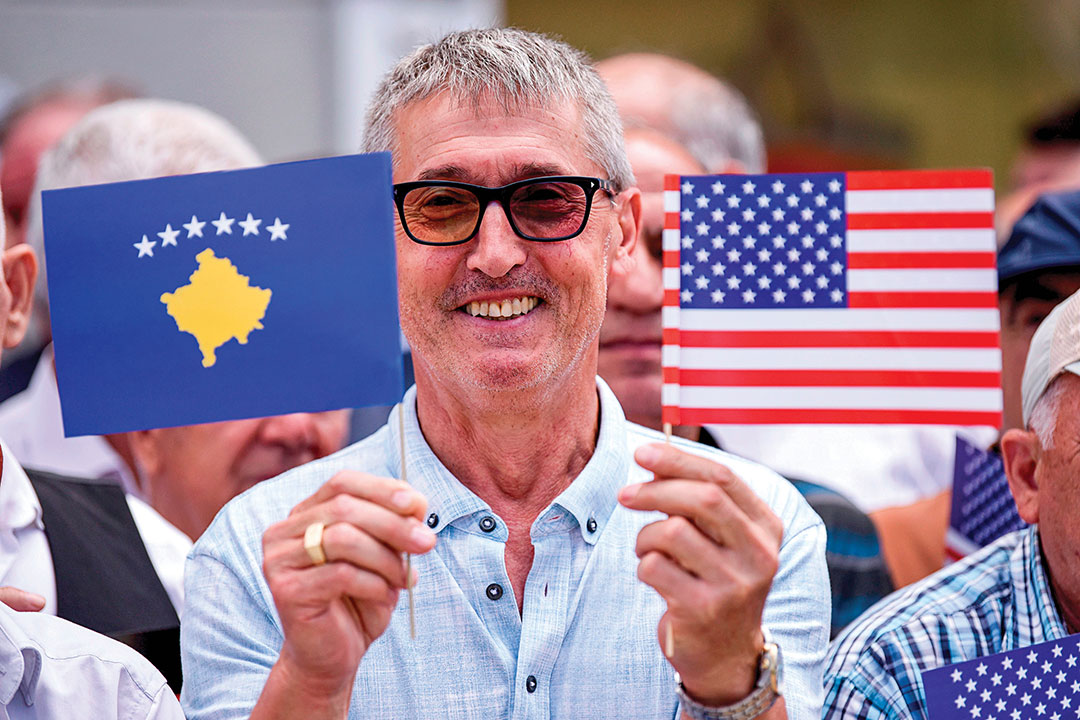Kosovo moves toward full European integration
By Mimoza Ahmetaj, Kosovo’s ambassador in Strasbourg, France
A pandemic is harassing the global population while a shift in geopolitical trends from liberal to authoritarian is increasingly visible in some long-standing democracies. Propaganda, political corruption and election interference are only a few of the tools being used to undermine democratic values. This trend has transformed governments and shaken stable societies in Europe and beyond. Democracy is a term coined for a government of the people, by the people and for the people. In contrast, dictatorship is a rigid form of government in which people are not given the liberties they could otherwise get in a democracy.
I come from a country that transitioned from a centralized form of government to a democracy, and understanding how people can prevent and overcome dictatorships has been one of my major concerns for many years. This has been nurtured in part by a belief that human beings should not be dominated and destroyed by such regimes. I have lived that reality and know many people who have suffered under dictatorships. I have learned about the terror of communist rule in various countries from books, personal experience and personal contacts. The terror of these systems remains especially poignant to me because they were imposed in the name of liberation from oppression and exploitation. A lesson from Kosovo’s liberation and independence and the dissolution of the former Yugoslavia is that successful struggles against dictatorships can be waged. Over the centuries, we have seen various dictatorships collapse or stumble when confronted by defiant, mobilized people. Often seen as firmly entrenched and impregnable, some of these dictatorships proved unable to withstand the concerted political, economic and social defiance of the people.
The pandemic and quarantine have served as food for thought when analyzing the reality surrounding us and the reality that we are living with. The year 2020 brought to the surface a variety of crises that were then complicated by political, military or economic crises. When a country’s economic growth isn’t the result of the democratization of society — as is the case in China or Russia, both being authoritarian states — that successful economy becomes a threat for poor and unsustainable democracies rather than an added value. We have witnessed the government of China and its approach toward Hong Kong protesters fighting for more freedom, or the plight of Uighurs, Kazakhs and other Muslim minorities in China struggling for human rights.

The same can be said of Syria and Middle Eastern countries that have been at a crossroads for some time, trying to overcome dictatorships. The 2020 elections in Belarus and the disputed win by President Alexander Lukashenko is another instance in which “democracy” is used as a tool to dominate people and not to serve their interests. It does not matter whether it is Russian President Vladimir Putin, Lukashenko or Chinese President Xi Jinping — they have one thing in common and that is the motivation and action taken to shut out the Western values that threaten the authoritarian rule of their countries. Though the Berlin Wall fell 30 years ago, the division between East and West remains. The fact that the European Union hasn’t been able solve the pan-European issue and successfully integrate all the countries committed to being in the EU has presented an opportunity to the East to come up with offers, be it financial, political or military, to those countries left out of the EU.
This is best described and visualized in the Western Balkans, a region of six countries that together have a population similar to that of the German state of North Rhine-Westphalia (17.9 million). Located in the heart of Europe and surrounded by the EU, the region presents a hot spot and chessboard for all possible political and military maneuvering. The Western Balkans, over the previous century, has proved to be a region where major powers exercised their influence, be it militarily, politically, economically or ideologically. The beginning of World War I, several Balkan wars and lastly the bloody dissolution of the former Yugoslavia are still very present in people’s memories.
Because of its geopolitical position — surrounded by EU countries and NATO member states with access to the Adriatic — and with a history of nonalignment with East or West, the region continues to attract the attention of third states, whether from the East, South or Southeast. The Balkans are perceived as a small bite for giant powers, yet have proved to be the opposite.
Appointments or elections of a rapporteur to any multilateral organization reveal the deep fragmentation and quest for domination in the region. Kosovo’s latest experience with the election of a rapporteur to the Council of Europe (CoE) was a manifestation of this gamesmanship. But this was more than a game. I witnessed an open confrontation over values and democratic civilizations between a German Christian Democratic Union (CDU) parliament member and Russian intelligence agency member. This is not the first time Kosovo has had a rapporteur in a multilateral organization such as the CoE, United Nations, the European Parliament, the Organization for Security and Co-operation in Europe and others. But by supporting the German member of parliament, Kosovo reaffirmed its pro-Western orientation and sent a message that it will not allow authoritarian forces to represent Kosovo in relevant institutions such as the CoE and the European Court for Human Rights, Europe’s highest institution of justice.
The recent transitional situation regarding the EU and Brexit along with the divergent attitudes toward the EU’s future and enlargement in particular have left few alternatives to Western Balkan states. Some have turned to the East, fueling Putin’s ambitions in the Balkans and Europe. Russia’s influence is obvious, particularly through its financing of political parties and attempts to influence civil society, the media, military arms and other matters important to free societies. This aggressive Russian campaign is aimed at shifting the global political order.

Today’s Russia is neither Gorbachev’s nor Yeltsin’s; it is Putin’s. It’s been more than 30 years since the fall of the Berlin Wall. In the Western Balkans, it was hoped that by now the “isolation wall” affecting the region and the process of EU integration would have fallen. Kosovo has managed to prevent Russia from interfering in domestic politics because of its pro-Western policy and the massive public support for the U.S. and for EU engagement. Russia’s attempt to undermine this pro-Western national consensus in Kosovo emerged in 2019 during the aforementioned election of the rapporteur for Kosovo to the CoE. Russia supported Alexei Kondratiev, a Russian senator and colonel in the Russian military intelligence service (GRU) who is close to Putin. Kondratiev was accused of kidnapping a woman while serving with the Russian military in Kosovo in 1999-2000 and was forced to leave the country.
His election would have meant a permanent blockade of Kosovo’s path to state-building and EU integration. His engagement would have been dedicated to returning Kosovo under Serbian sovereignty. In that case, it would have been Russia representing Kosovo’s interests and its citizens in the CoE. That would have prevented Kosovo from joining multilateral organizations because the impact of CoE reports is not limited to the CoE, but has direct relevance to the EU, where 60% of a country’s progress report is based on the findings of its CoE reports. EU integration cannot be imagined without CoE membership because it is mandatory for states to implement and align their observance of human rights and the rule of law with the acquis communautaire, the EU’s community of laws. Kondratiev’s election would have significantly boosted Russia’s attempts to influence the Western Balkans and exclude the EU from the region.
But the CoE assembly instead elected Peter Beyer, the CDU member from Germany, as its new rapporteur for Kosovo. It marked the first time that Kosovo’s favored candidate has been elected as rapporteur in the CoE and is exactly what Kosovo needs. The competition was fierce and touched on all the geopolitics in Kosovo. Thirty years after the fall of the Berlin Wall, Russia was facing off with Germany in Kosovo as it tried to impose its dominance in the Balkans and throughout Europe. This was a confrontation between East and West, between democratic and authoritarian values, the past and the future, the will of the citizens of Kosovo and the interests of some member states. It was not an easy game to play in a multilateral organization like the CoE, with 47 member states, where Russia is a member and a top donor and where the U.S. is a donor but not a member and therefore has no vote. Kondratiev’s defeat sent a message to Russia that not everything can be bought and manipulated, particularly the will and desire of Kosovo and its pro Euro-Atlantic determination. Over the years we have learned to side with democratic powers and those who helped liberate and build the state of Kosovo.
The election of Beyer is a binding agreement that will facilitate and lead Kosovo throughout the process of membership to the CoE. It is a message to Russia that it’s the EU and the U.S. that will speak on behalf of Kosovo and its people because over the years they have invested human and financial capital in Kosovo, with thousands of soldiers still actively serving in Kosovo and a Kosovar diaspora close to 1 million living in Western Europe and the U.S. who are contributing to their homeland.
This was a watershed moment for the Balkans. Had the Russian candidate been elected, the mosaic of Russian dominance would be completed in the Balkans. However, winning this battle does not mean the war is over. There will be many battles ahead until Kosovo completes the process of state building and state consolidation. But make no mistake, this was a clear message to the U.S. and the EU that Kosovo will always be grateful for each of their engagements and for their continued support. Once again, good intentions and commitment prevailed over dictatorships and the authoritarian systems they tend to impose.


Comments are closed.